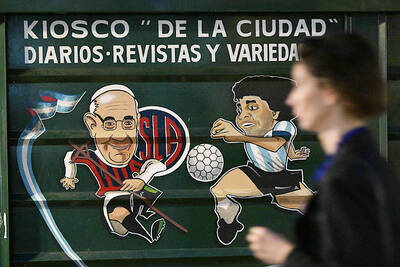Hong Kong’s Rugby Sevens is one of the most hotly anticipated corporate events on the global sporting calendar, but many money managers might be missing from this year’s quintessential party weekend at one of the world’s premier financial centers.
In previous years, fund managers, bankers and brokers have flown to Hong Kong from across the world for the three-day event renowned for excessive drinking, fancy dress and raucous behavior. Rugby itself sometimes takes a back seat.
However, compliance rules are getting tougher, prompted in part by a recent UK crackdown on the asset management industry, and many institutional fund managers will have to forgo bank hospitality to avoid conflicts of interest. This year’s tournament is to start tomorrow.
“Institutional fund managers are finding it difficult to accept hospitality beyond reasonable limits because compliance is getting stricter,” said Keith Taylor, a portfolio manager at Canada-headquartered BMO Asset Management in Hong Kong. “The broker-fund manager relationship has changed a lot from what it used to be a few years ago and is set to become even tougher as professional money managers take great pains to avoid what can be perceived as conflicts of interests.”
In Asia, the Hong Kong Sevens is perhaps the most visible corporate-friendly sporting event.
The head of Asia trading at a top-20 global asset manager in Hong Kong said: “The bigger international firms have cut down on accepting hospitality. We can’t even go to the [Hong Kong] Rugby Sevens. All that stuff around sporting events is banned.”
The Sevens, sponsored this year by flagship airline Cathay Pacific and HSBC, has assumed a legendary status in recent years.
When the playing stops, fans spill out of the 40,000-capacity stadium into the streets, transforming the surrounding Causeway Bay and Wan Chai districts on Hong Kong island into an alcohol-soaked carnival where cheerleaders and Oompa Loompas cavort with Kermit the Frogs and men dressed as nuns.
For many of the world’s most influential investment executives, watching the Hong Kong Sevens this year will have to be funded by what is known in the industry as “personal account” — paying for yourself. That is if they show up at all.
Global fund management executives say that merely socializing out of hours with bankers and brokers, let alone partying on their tab, is becoming increasingly unpalatable to compliance heads because international asset managers are under growing pressure from US and European regulators, as well as their trustees and clients, to prove that they give business to banks and brokers based on merit rather than cozy relationships.
On the other side, pressure to clinch client business is high, with the total pot of money earned by brokers down by a fifth from 2006 to US$225 billion last year, according to estimates by Oliver Wyman and Morgan Stanley, and is set to drop further.
Although the pressure is emanating from the US and Europe, it is reverberating across Asia as compliance officers devise consistent global policies, regulatory experts said.
“Even in Asia, these international firms have to achieve the highest compliance standards,” said Philippa Allen, chief executive of consultancy ComplianceAsia. “As a result, you’re seeing a change in the make-up of the clients who are invited to these [corporate] boxes, with a lot more private wealth, family offices and high net worth individuals, who are not subject to the same regulatory pressures.”

Bologna on Thursday advanced past Empoli to reach their first Coppa Italia final in more than half a century. Thijs Dallinga’s 87th-minute header earned Bologna a 2-1 win and his side advanced 5-1 on aggregate. Giovanni Fabbian opened the scoring for Bologna with a header seven minutes in. Then Viktor Kovalenko equalized for Empoli in the 30th minute by turning in a rebound to finish off a counterattack. Bologna won the first leg 3-0. In the May 14 final in Rome, Bologna are to face AC Milan, who eliminated city rivals Inter 4-1 on aggregate following a 3-0 win on Wednesday. Bologna last reached the

If the Wild finally break through and win their first playoff series in a decade, Minnesota’s top line likely will be the reason. They were all over the Golden Knights through the first two games of their NHL Western Conference quarter-finals series, which was 1-1 going back to Minnesota for Game 3 today. The Wild tied the series with a 5-2 win on Tuesday. Matt Boldy had three goals and an assist in the first two games, while Kirill Kaprizov produced two goals and three assists. Joel Eriksson Ek, who centers the line, has yet to get on the scoresheet. “I think the biggest

From a commemorative jersey to a stadium in his name, Argentine soccer organizers are planning a slew of tributes to their late “Captain” Pope Francis, eulogized as the ultimate team player. Tributes to the Argentine pontiff, a lifelong lover of the game, who died on Monday at the age of 88, have been peppered with soccer metaphors in his homeland. “Francisco. What a player,” the Argentine Football Federation (AFA) said, describing the first pope from Latin America and the southern hemisphere as a generational talent who “never hogged the ball” and who showed the world “the importance of having an Argentine captain,

Noelvi Marte on Sunday had seven RBIs and hit his first career grand slam with a drive off infielder Jorge Mateo, while Austin Wynn had a career-high six RBIs as the Cincinnati Reds scored their most runs in 26 years in a 24-2 rout of the Baltimore Orioles. Marte finished with five hits, including his eighth-inning homer off Mateo. Wynn hit a three-run homer in the ninth off catcher Gary Sanchez. Cincinnati scored its most runs since a 24-12 win against the Colorado Rockies on May 19, 1999, and finished with 25 hits. Baltimore allowed its most runs since a 30-3 loss to